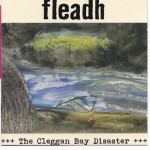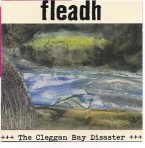Saoirse Mhor: Vocals, Guitar & percusion
Tommy Gorny: Guitar,Bass & backing vocals
Marcus Eichenlaub: Fiddle
Danny Durschner: Banjo, Mandolin, Harmonica & backing vocals
Frank Weber: Uilleann pipes, Low whistle & Bodhran
Guest Musicians:
- Uli Schmidt: Banjo
- Isabel Eichenlaub:Cello
Audio
Row Home:
The Cleggan Bay Disaster:
The Curragh Song:
Track Listing
- Eastbound Train
- Castle Kelly/Sligo Creek.
- Hill of Plenty
- Return From Fingal/Heaton Chapel
- Row Home
- The Cleggan Bay Disaster
- Trip to Brittany/Sliabh Russell/Scarce o' Tatties/Lost & Found
- Sally Brown
- Cahir's Kitchen/Moondance
- The Ace & Duce of Pipering
- The Ballad of John B. Whistlin'
- Tongadale/New Rigged Ship.
- The Curragh Song (Shadowers)
Fleadh, in it's present line up was formed at the end of 2007. The original band goes back as far as 1999 and the only remaining founder of that era is Uilleann Pipes player Frank Weber. Frank Dürschner (mandolin, banjo, vocals) and Tommy Gorny (guitar, vocals) are other long standing members.
With the recruitment of vocalist Saoirse Mhór and fiddle player Marcus Eichenlaub they received the needed 'breath of fresh air' to move the band forward.
The two Franks and Marcus are avid sessionists, regularly playing in the many Irish Pubs around the Pfalz area. Regular visits to Ireland keep them constantly in superb playing form.
Fleadh seek to combine this section of the band with the vocalist/singer approach of Saoirse. Saoirse gets around Germany too - busking on the streets and at Street Artist Festivals in major German cities.
Tommy is the heartbeating drive on guitar in Fleadh. Intricate detailed arrangements and pulsating rhythm weaving through jigs, reels and songs. Tommy is also a well weathered musician known for his playing with the band Space Debris.
Working as an Irish Folk Band Fleadh do not wish to leave the path for Middle Age Music or the all too eminent Acid / Punk / Neo Folk. Fleadh want to retain the respect for Irish music and yet seek to mix styles and ryhthm but still stay within the boundaries of Folk. Singing and playing. That's Fleadh!
More details at www.fleadh.de
See the lads perform on youTube http://www.youtube.com/user/FleadhMusic
Press Reviews
www.netrhythms.com
The name is deceptive, for although its music is definitely Irish, indeed pan-Celtic in flavour, it's actually a German band; in fact it's that country's top folk-rock outfit and have been in business since 1999, with its present lineup dating back to 2007. Theirs is a fresh-faced, accomplished sound, owing more to folk than rock, with a keenly balanced mix of timbres (guitar, bass, fiddle, banjo/mandolin and uilleann pipes/whistle) that mixes styles and rhythms in the modern rather than strictly traditional style I'd say, incorporating touches of jazzy syncopation as unassumingly as driving dance rhythms.
The instrumental abilities of the members of this ebullient quintet can't be called into question, and neither can their respect for Irish tradition, although their interpretation of that word can be heard to embrace contemporaries like Waterboys, Christy Moore and Van Morrison - the latter's Moondance crops up cheekily appended to a slightly ska-toned take on Paddy Keenan's tune Cahir's Kitchen, while Luka Bloom's Eastbound Train heads up the album's tracklist. The album's principal interest for many, though, will probably be the five songs penned by the band's singer, Saoirse Mhór, whose fine, very Irish vocals (with their frequent distinct shadings of Christy Moore) impart a signature feature to the band's music. In particular, the title track's unsentimental but clearly felt account of an archetypal tragedy and the preceding fisherman's ballad Row Home make for a powerful sequence, but although the more puckish pub-folk liveliness of The Ballad Of John B. Whistlin' and The Curragh Song don't ring anything like as true musically you can't deny that Saoirse has a flair for composition.
The instrumental tracks are suitably lively and will give much pleasure. The best of these is surely the deftly dynamic seven-minute set of jigs strategically placed at the centre of the running order, but there's also much to enjoy in the Tongadale/New Rigged Ship pairing and the classic set dance The Ace And Deuce Of Pipering (take a bow here, Fleadh's master piper and founder member Frank Weber). The disc also includes a distinct (though exceedingly likeable) curiosity, a cowpoke-country-inflected rendition of the shanty Sally Brown that probably takes the "roll and go" refrain a little too literally!
In spite of the disc's title, this is quite a feelgood record and Fleadh would, on this showing, appear to deserve their high reputation as one of the best of the what might be classed non-indigenous bands purveying this kind of music. David Kidman July 2013
R2 July/Aug 13
Fleadh is described as the Germany's top folk-rock band but l'd drop the rock bit. They play with a deft touch and there's no plodding bass or pounding drums although there is plenty of crossover and dynamic music. The quintet mixes songs by Saoirse Mhor, traditional and written tunes and covers from two of the world's greatest living lrishmen, Luka Bloom and Van Morrison.
This is a very Irish album although it includes the only country and western shanty I've ever heard in a quite extraordinary rendition of 'Sally Brown'. Knowing the Germans' reputation for their love of side-splitting humour it's probably supposed to be funny although the transatlantic style is echoed in 'The Ballad Of John B. Whistlin" so I'm not sure.
Elsewhere we have classics like 'Ace And Deuce Of Pipering' — Frank Weber is the band's piper- and 'New Rigged Ship' and, in the title track, the sort of disaster that is found all over the Celtic world. l'd bet that Fleadh are a blast live and this is an album I'd play when l didn't want to take life too seriously. Dai Jeffries
FATEA web site
Folk rock is a fairly standard genre over here on the British Isles now, but it really has spread all over the world. What immediately stuck me with this band was curiosity, as I wondered how a German folk band would consider itself as an Irish Folk band.
The answer in the end was: Very easily. Fleadh is a very well refined folk band using a fantastic merge of banjo, guitar, mandolin, fiddle and booming vocals. Their latest album release 'The Cleggan Bay Diaster' simply does not disappoint.
We get a real feel for Irish music through this album as classic sounding sets such as 'Castle Kelly/Sligo Creek' and 'Tongadale/New Rigged Ship' give us a bouncing reels but with a unique pattern that makes them distinctly recognisable.
The entire album gives us a great taste of the traditional but added spices to really keep you keen for the next set to come on. 'The Cleggan Bay Disaster' to me seems like a manifestation of well known pub sessions, giving that magic feel and atmosphere that you experience when musicians all play in sync.
Just as an extra bonus, the album is not limited to that kind of session music either, generally the vocal songs give us beautifully sounding tracks which is where we really get a feel for the distinctiveness of Fleadh. 'Hill of Plenty' gives us a very strong harmony during the curious of multiple vocals and helps you to feel for the story being told.
Overall an undeniably brilliant album which should be a standard for any folk collection. Paul Rawcliffe
Folk Words
Working with the endearing Irish folk tradition, blending original arrangements and compositions, Fleadh are in many ways an archetypal Irish folk band. Their latest album 'The Cleggan Bay Disaster' shows their abiding respect for and skill with Irish folk but also demonstrates their eagerness to move within the tradition to create their own particular sound. The fact they abide in Germany has little to do with it. The essence of Irish culture and tradition has a habit of appearing all over the world with the wanderings of its people - the search for a future, the Flight of the Wild Geese, escaping famine and the clutches of absentee landlords - Irish culture, mythology, stories and music have travelled far and wide.
On this album, 'The Cleggan Bay Disaster' the band show off their considerable ability combining songs and instrumentals to deliver a fine collection. There's a sequence of reels 'Castle Kelly / Sligo Creek' , a set of majestic marches 'Return from Fingal / Heaton Chapel' a blistering quartet of jigs with 'Trip to Brittany / Sliabh Russel / Scarce o' Tatties / Lost and Found' and a superb set dance 'Ace and Deuce of Pipering' . Their touch with songs is augmented by Saoirse Mhór's Irish lilt and include the eponymous 'The Cleggan Bay Disaster' which tells the tale of a 1927 October Storm that devastated two Connemara Communities; with 'The Ballad of John B. Whistlin'' they allow an Americana edge to creep into the mix and there's also classic seafaring song with 'Sally Brown'.
For all fans of Irish folk ' The Cleggan Bay Disaster' is definitely one for the collection.
Undergoing a few changes in their years together, Fleadh are currently Saoirse Mhór (vocals, guitar, percussion, songwriting) Tommy Gorny (guitar, bass, backing vocals) Marcus Eichenlaub (fiddle) Frank Dürschner (banjo, mandolin, harmonica, backing vocals) and Frank Weber (uilleann pipes, low whistle, bodhrán). On the 'The Cleggan Bay Disaster' they're aided by guest musicians: Uli Schmidt (banjo) and Isabel Eichenlaub (cello). Reviewer: Tim Carroll
www.Celtic Rock March 4th
After a break of nearly three years since their last album Humpy 'n Lumpy in 2010 Fleadh are back with a much sharpened profile. The new album bears the stamp of front man Saoirse Mhór who brings five of his own songs including the title track The Cleggan Bay Disaster. In their own words Fleadh strive to play honest Irish Folk music. That indeed sums up their lineup of fiddle mando,banjo and pipes but they clearly allow more room for percussion and bass in this new production. They also integrate other styles such as swing, bluegrass or blues. Anything that grooves. The Irish melodies are not just played but fitted out with musical counterparts and intricate guitar parts which weave in and out of the arrangements consisting of unexpected intros or middleparts.
Lots of swing and groove, especially in Van Morrison's Moondance. What I miss is a dance character in the arrangements or a power that is reached with the melody instruments in some solo or unison passages. Nevertheless the album is played at a highly techical niveau. The sound production rounds it off.
Saoirse Mhór sings somewhat reserved but intense and is supported with effective backing vocals. Eastbound Train is an ideal kickoff for the album. Mhór's own songs differ quite in character but with strong singable refrains. The Cleggan Bay Disaster tells of the tragedy off the west coast of Ireland in 1927. Even though a sad story the song has a swinging beat. Almost better is The Hill of Plenty which covers the present Irish financial crisis and then Row Home which creates a wonderfully warm musical scenery possibly challenging Christy Moore's Ride On. The album finishes up on a lighter note with The Curragh Song. Funny childhood memories have Mhór singing with a heavy Kildare accent and almost sounding more like Christy Moore does himself. Both originate from the Curragh and incidentally where the CD release took place.




